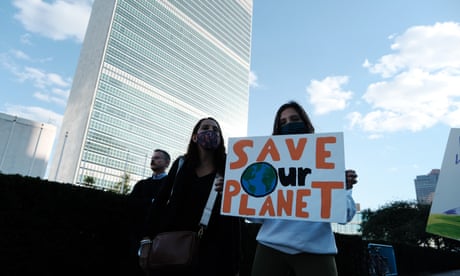- by foxnews
- 12 Mar 2025
Earth is on track to exceed 1.5C warming in the next decade, study using AI finds
Earth is on track to exceed 1.5C warming in the next decade, study using AI finds
- by theguardian
- 31 Jan 2023
- in news

The world is on the brink of breaching a critical climate threshold, according to a new study published on Monday, signifying time is running exceedingly short to spare the world the most catastrophic effects of global heating.
Using artificial intelligence to predict warming timelines, researchers at Stanford University and Colorado State University found that 1.5C of warming over industrial levels will probably be crossed in the next decade. The study also shows the Earth is on track to exceed 2C warming,which international scientists identified as a tipping point, with a 50% chance the grave benchmark would be met by mid-century.
Utilizing a neural network, or a type of AI that recognizes relationships in vast sets of data, the scientists trained the system to analyze a wide array of global climate model simulations and then asked it to determine timelines for given temperature thresholds.
Half a degree of heating may not seem like a lot, but the increased impacts are exponential, intensifying a broad scale of consequences for ecosystems around the world, and the people, plants and animals that depend on them. Just a fraction of a degree of warming would increase the number of summers the Arctic would be ice-free tenfold, according to the Intergovernmental Panel on Climate Change, a global consortium of scientists founded to assess climate change science for the UN. The difference between 1.5C and 2C also results in twice the amount of lost habitat for plants and three times the amount for insects.
The change will also fuel a dangerous rise in disasters. A warmer world will deliver droughts and deluges and produce more firestorms and floods. Scorching heatwaves will become more severe and more common, occurring 5.6 times more often at the 2C benchmark, according to the IPCC, with roughly 1bn people facing a greater potential of fatal fusions of humidity and heat. Communities around the world will have to come to grips with more weather whiplash that flips furiously between extremes.
Climate scientists have long been warning of the near-inevitability of crossing 1.5C, but by offering a new way of predicting key windows, this study has made an even more urgent case for curbing emissions and adapting to the effects that are already beginning to unfold.
- by foxnews
- descember 09, 2016
Daring airport trend has travelers arriving at gate 15 minutes before takeoff
Flight passengers are participating in the new viral trend, "airport theory," with flyers arriving at their gates 15 minutes before their flights depart. A travel expert weighs in.
read more


